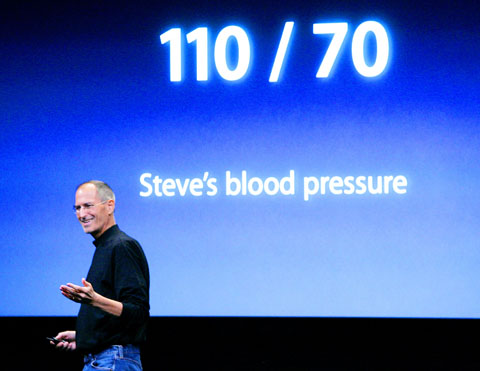Apple on Tuesday unveiled a revamped line of Macintosh laptop computers made leaner, slicker, faster and a bit more affordable.
Along with showing off new MacBook models heading for store shelves, Apple cut the price of the original version to US$999.
The price drop marked the first time Apple is selling a laptop computer for less than a thousand dollars.

PHOTO: AP
“We sell a ton of these MacBooks and people love it,” Apple chief executive Steve Jobs said as he announced that US$100 was being trimmed from the model’s price tag.
Enhanced MacBook, MacBook Pro and MacBook Air models boasted improved features in Apple’s historic price range of US$1,200 to US$2,500.
Key upgrades to Macintosh laptop models included custom-designed graphics processors by NVIDIA to enhance computer game play and video viewing, as well as glass touch-pads that allow finger gesture controls.
“Apple did some things that are critical to this market,” said analyst Rob Enderle of Enderle Group in Silicon Valley. “It really is more for the money. In a market where people are very focused on value, that should play well.”
Before fielding questions from reporters gathered for the event at Apple’s headquarters in Cupertino, California, Jobs flashed “110/70” on a screen behind the stage.
“This is Steve’s blood pressure,” Jobs said in a joking reference to a bogus blogger report that wrongly claimed he had suffered a heart attack. “This is all we are going to talk about Steve’s health today. If you want to see that number go higher, just ask some more questions.”
A gaunt looking Jobs turned portions of the presentation over to other Apple executives in what may have been an effort to show the company’s fortunes do not rise or fall with him alone.
“After the heart attack scare the market is still nervous there is no heir apparent at Apple,” Enderle said, adding that he suspects Jobs, who was treated for pancreatic cancer in 2004, is undergoing chemotherapy. “None of those guys could stand up and be a Steve Jobs. He presents like a minister at a holy revival to his audience. His knack for putting together a story is unmatched in the industry.”
Sales of Macintosh laptop computers have outpaced the industry average each fiscal quarter for nearly four years. MacBooks have grown to account for 18 percent of US laptop computer sales, industry statistics showed.
In related news, South Korean consumer electronics giant Samsung is reportedly planning to break into the packed US laptop computer arena next year.
Samsung executives cited in the Wall Street Journal and other news outlets on Tuesday said the company would return to the US laptop market with low-priced “netbooks” as well as thin, powerful models aimed at Apple’s elite MacBook Air.
Samsung said it would sell its laptops in a partnership with a yet-to-be-disclosed US retail chain.

Nvidia Corp yesterday unveiled its new high-speed interconnect technology, NVLink Fusion, with Taiwanese application-specific IC (ASIC) designers Alchip Technologies Ltd (世芯) and MediaTek Inc (聯發科) among the first to adopt the technology to help build semi-custom artificial intelligence (AI) infrastructure for hyperscalers. Nvidia has opened its technology to outside users, as hyperscalers and cloud service providers are building their own cost-effective AI chips, or accelerators, used in AI servers by leveraging ASIC firms’ designing capabilities to reduce their dependence on Nvidia. Previously, NVLink technology was only available for Nvidia’s own AI platform. “NVLink Fusion opens Nvidia’s AI platform and rich ecosystem for

WARNING: From Jan. 1 last year to the end of last month, 89 Taiwanese have gone missing or been detained in China, the MAC said, urging people to carefully consider travel to China Lax enforcement had made virtually moot regulations banning civil servants from making unauthorized visits to China, the Control Yuan said yesterday. Several agencies allowed personnel to travel to China after they submitted explanations for the trip written using artificial intelligence or provided no reason at all, the Control Yuan said in a statement, following an investigation headed by Control Yuan member Lin Wen-cheng (林文程). The probe identified 318 civil servants who traveled to China without permission in the past 10 years, but the true number could be close to 1,000, the Control Yuan said. The public employees investigated were not engaged in national

ALL TOGETHER: Only by including Taiwan can the WHA fully exemplify its commitment to ‘One World for Health,’ the representative offices of eight nations in Taiwan said The representative offices in Taiwan of eight nations yesterday issued a joint statement reiterating their support for Taiwan’s meaningful engagement with the WHO and for Taipei’s participation as an observer at the World Health Assembly (WHA). The joint statement came as Taiwan has not received an invitation to this year’s WHA, which started yesterday and runs until Tuesday next week. This year’s meeting of the decisionmaking body of the WHO in Geneva, Switzerland, would be the ninth consecutive year Taiwan has been excluded. The eight offices, which reaffirmed their support for Taiwan, are the British Office Taipei, the Australian Office Taipei, the

CAUSE AND EFFECT: China’s policies prompted the US to increase its presence in the Indo-Pacific, and Beijing should consider if this outcome is in its best interests, Lai said China has been escalating its military and political pressure on Taiwan for many years, but should reflect on this strategy and think about what is really in its best interest, President William Lai (賴清德) said. Lai made the remark in a YouTube interview with Mindi World News that was broadcast on Saturday, ahead of the first anniversary of his presidential inauguration tomorrow. The US has clearly stated that China is its biggest challenge and threat, with US President Donald Trump and US Secretary of Defense Pete Hegseth repeatedly saying that the US should increase its forces in the Indo-Pacific region